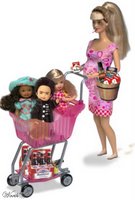
Two trade mark cases today: Mattel Inc. v. 3894207 Canada Inc., 2006 SCC 22 and Veuve Clicquot Ponsardin v. Boutiques Cliquot Ltée, 2006 SCC 23.
Binnie is working hard on his prose style, but it still needs improvement. He opens Veuve Clicquot as follows:
Among those with champagne tastes, the brand of Veuve Clicquot Ponsardin is considered among the very best. It has been building its fine reputation with the drinking classes since before the French Revolution.
The Pithlord writes his posts in too much haste to draw attention to the clunky repetition of "among" in the first sentence. But "fine" should not modify "reputation," and "drinking classes" was hackneyed before Oscar Wilde had his unfortunate encounter with the civil justice system.
Anyway, the Pithlord is happy with the result. We should all take a dim view of the imperial claims of trademark holders. The purpose of trademark protection is to prevent customer confusion -- if it doesn't exist, then we should tell litigious companies to buzz off. In Clicquot, that's more or less what the Court did.
In Mattel too, the corporate giant lost. A small chain of restaurants in the Montreal area called "Barbie's" obtained an exemption from Mattel's "famous trade mark," and the Court upheld this with much mumbo-jumbo about standards of review and patent unreasonableness.
Unfortunately, the Court gave a sizeable bone to the International Trademark Association. In the name of promoting branding across product lines, the Court limited the Pink Panther and Lexus doctrines that the possibility of confusion should focus on the "nature of the wares, services or business." I agree that companies should be able to let consumers know whose reputation stands behind a particular product, including in a new line, but I see no particular reason for the law to protect branding for the sake of branding.
Still, the good guys won, so thumbs up.

No comments:
Post a Comment